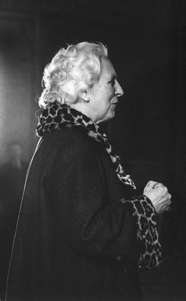
Objective thought is the look from Above. A free look, one that sees. Without this look placed upon me and which sees me, my life is the life of a blind man, who goes wherever impulse pushes him, without knowing why or how. Without this look placed upon me, I cannot know that I exist.

I have the power to lift myself above myself and see myself freely . . . to be seen. I have the power that my thought not be enslaved. For this, it must let go of all the associations that hold it captive, passive. It must cut the threads that bind it to all these images, to all these forms; it must free itself from the constant pull of emotion. It must feel the power it has to resist this pull, to see it while lifting itself steadily above it. In this movement thought becomes active; it becomes active in the act of purifying itself; and in this way it acquires an aim, a single aim: to think “I,” to realize “who I am,” to enter into this mystery.
Otherwise, thoughts are only objects, occasions for enslavement, snares in which real thought loses its power of objectivity and voluntary action. Troubled by words, images, forms that attract it, real thought loses its faculty of seeing. It loses the sense of I. Then I am nothing more than an organism adrift. A body deprived of intelligence. In the absence of this look, I am compelled to return to automatism and the law of accident.
This look at the same time situates me and frees me. And in my best moments of collectedness, I come to a state where I am given to know, to feel the goodness of this look which descends upon me, which embraces me. I feel myself under the radiance of this look.
Each time, the first step is the recognition of a lack. I feel the necessity for a thought. The necessity for a free thought turned toward myself, so that I might actually become conscious of my existence. An active thought whose sole aim, sole object is I . . . to find I again.
This is my struggle: a struggle against the passivity of my thought. A struggle without which nothing more conscious can find room, can be born. It is a struggle to leave the illusion of “I” in which I live, in order to come closer to a more real seeing. At the heart of this struggle an order is created in the chaos, a hierarchy: two levels are revealed, two worlds. As long as there is only one level, there can be no seeing. Recognition of another level—that is the awakening of Thought.
Without this effort, thought falls back into a sleep inhabited by words, images, set notions, approximate knowledge, dreams and various disturbances. It is the thought of a man without intelligence. It is terrible to realize suddenly that one has lived without one’s own independent thought. Without intelligence. Without anything that sees what is real. And so, without connection with the world Above.
It is in my essence that I reunite with that which sees. If I could stay there, I would be at the source of something unique, something stable, at the source of that which does not change.
~ • ~
Under the variant title, The Awakening of Thought, this essay was originally published in Gurdjieff: Essays and Reflections on the Man and His Teaching, New York: Continuum, 1996, edited by Jacob Needleman and George Baker, from the French edition compiled by Bruno de Panafieu. The original French, dated July 23, 1958, is an extract from a notebook of Jeanne de Salzmann. This ‘close translation’ attempts to be as faithful as possible to the original. It is the work of Jack Cain and other members of the Gurdjieff Foundations of Toronto, Halifax and London.
| Copyright © 2003 Gurdjieff Electronic Publishing Featured: Fall 2003 Issue, Vol. VII (1) Revision: November 1, 2003 |